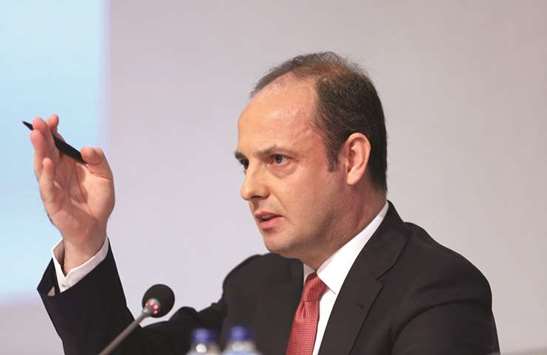Bloomberg/Ankara
Turkey’s central bank yesterday acknowledged it won’t meet its 5% inflation target for three more years, disappointing investors seeking signs that monetary policy would tighten.
Although governor Murat Cetinkaya pledged to raise borrowing costs when needed, his prediction of 6.7% inflation by the end of 2020 was seen as a dovish signal by investors who gathered in Ankara for the bank’s quarterly inflation report. He expects prices to rise 13.4% through this year and 9.3% through 2019.
This was the first time the governor provided an above-target forecast for three years into the future since taking office in 2016, and it comes with the inflation rate at its highest in 15 years. For investors surprised that the bank didn’t raise borrowing costs at its last rate meeting on July 24, it’s another indication monetary policy makers will put a premium on stimulating economic activity, according to Erkin Isik, a strategist at Turk Ekonomi Bankasi AS in Istanbul. That’s an agenda demanded by President Recep Tayyip Erdogan.
“The upward revision to medium-term forecasts suggests that the bank will prioritize growth over inflation and let inflation remain high for much longer,” Isik said by e-mail as Cetinkaya spoke.
The lira fell during the governor’s speech and was trading 0.4% lower at 4.90 per dollar at 12:31pm in Istanbul.
Unlike in his previous inflation reports, Cetinkaya went out of his way to explain last week’s rate decision. This year’s 500-basis-point increase in lending costs will take time to have an impact on demand conditions, which are set to soften with a re-balancing in the economy, he said.
His base-case scenario of a “moderate” slowdown in growth after last year’s 7.4% expansion is partly based on expectations the government will lower spending. Continued expansionary fiscal policies would result in higher inflation, according to the inflation report.
Taking into account the high inflation rate and current account deficit “at a time of tightening global financial conditions, such a situation would result in a higher country risk premium and increase the pressure on foreign-exchange levels, necessitating a tighter monetary policy stance to rein in price gains,” the report read.
Erdogan has repeatedly stressed he wants interest rates to come down, taking the anomalous approach that cheaper money would help to tame inflation by stimulating growth.



